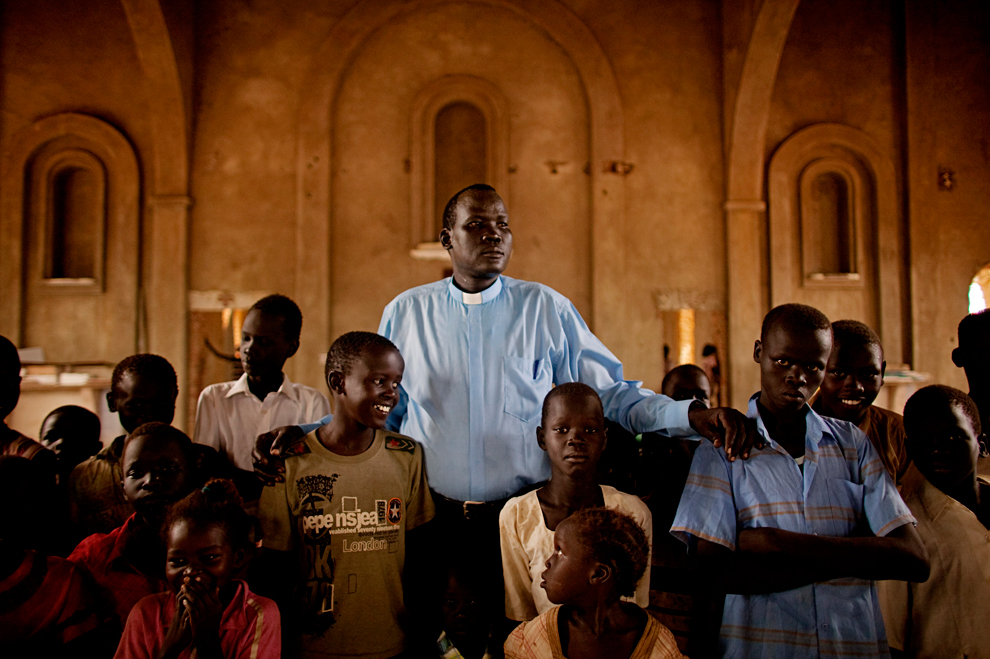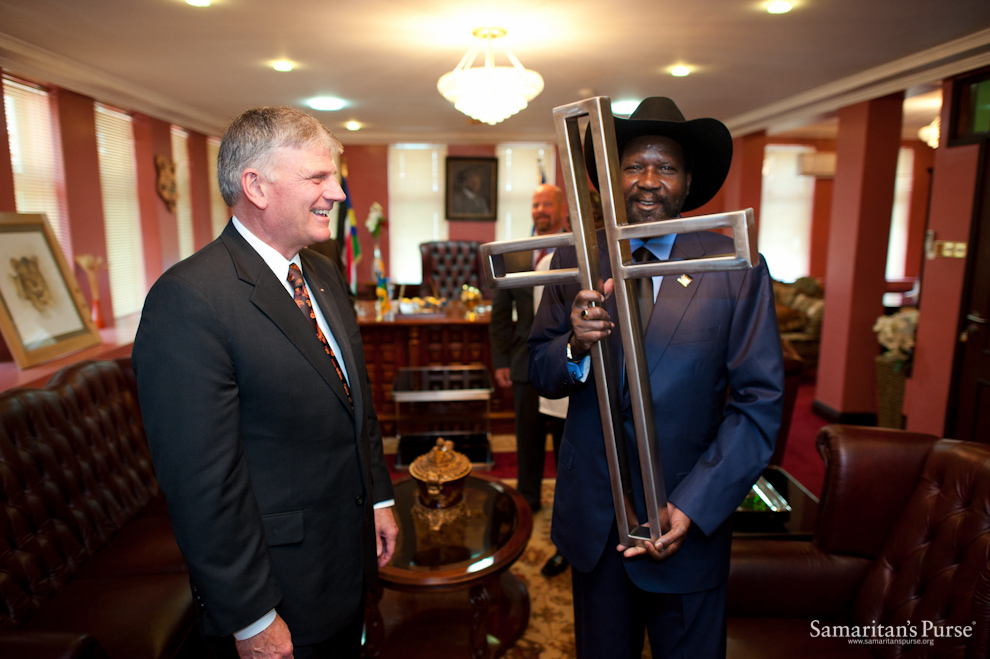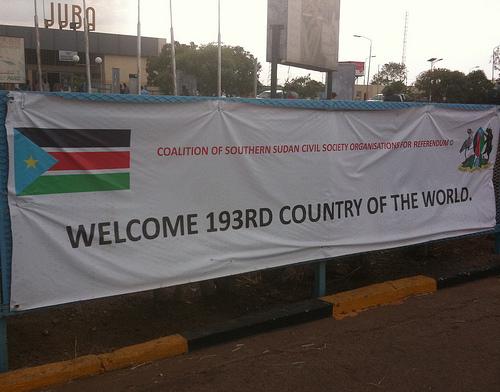By Alex Thurston
South Sudan, though less than six months old as an independent nation, already faces challenges to its political and cultural unity: rebels abound, opposition groups denounce the ruling party, and ethnic tensions simmer. Christianity has provided a powerful platform for political mobilization in the region’s past, and churches continue to represent the strongest force in Southern Sudanese civil society. As the new nation grapples with ethnic and political tensions, Christianity may help build unity – yet the power of the churches has limits.
Colonial Legacies and Christianity in South Sudan
British colonial rule did not introduce Christianity to present-day South Sudan – there were Christian kingdoms in East Africa prior to 1500, and Catholic missionaries were active in the region in the mid-nineteenth century – but colonial policies left a lasting impact on the character and social role of Southern Sudanese Christianity.
After the British pieced together the colony of Sudan from 1898-1910, colonial rulers treated the Southern provinces as a culturally and religiously distinct enclave that needed to be isolated and administered differently from the Arab Muslim North. While missionary activities were restricted in the North, missionaries had a freer hand in the South. Catholic, Presbyterian, and Anglican missionaries made limited conversions during the colonial period, but they had a lasting impact on education. When the British conjoined North and South Sudan under one administration in 1946, university-educated Northerners dominated politics and the civil service, but the few Southerners with advanced educational credentials were largely products of these mission schools.
The foundations missionaries laid in the colonial era – including the training of South Sudanese Christian leaders – enabled Christianity to spread more widely in the years after independence in 1956. Northern policies of forced Arabization and Islamization also fueled Southerners’ conversions to Christianity, as Christian faith became a mark of independence and pride. Christians have provided much of the leadership for South Sudan’s major political movements since the first outbreaks of Southern anger at Northern domination in the 1950s.
Christian leaders of rebel movements like Anya Nya (the main Southern army during Sudan’s first civil war from 1955-1972) and today’s ruling Sudan People’s Liberation Movement (the SPLM, whose armed wing, the SPLA, was the main Southern army during the second civil war of 1983-2005) generally followed one or both of two paths to leadership. The first was advanced education, sometimes in missionary schools. Such was the background of Joseph Oduho (1929-1993), an early protester against Northern policies of Arabization and Islamization and later a founding member of SPLM. Dr. John Garang (1945-2005), who was head of the SPLM from 1983 until his death in 2005, came from a devoutly Christian family. Garang studied in Tanzania and the USA, receiving his PhD in Economics in 1981 from Iowa State University a mere two years before the second civil war broke out. Dr. Riek Machar (b. 1953), another Christian and current vice president of South Sudan, earned a PhD in Mechanical Engineering from the University of Bradford in 1984, and returned to Sudan to fight in the civil war almost immediately after. In one of the poorest and least developed countries in the world, it is striking to see how educated many of the SPLM’s leaders are, and how strongly education correlates with Christianity.
The second path to leadership in the SPLM and its predecessor movements was through military service, either for the national government, rebel armies, or both. Rebel armies were a vector for conversion to Christianity from the time of Anya Nya forward, when the faith began to serve as unifying force for soldiers from diverse backgrounds. Current South Sudanese President Salva Kiir, about whose early life little is known, may have been one such convert: born in 1951 and apparently lacking much formal education, he was fighting for Anya Nya by the early 1960s. Given that many SPLM leaders come either from the ranks of the educated or the military, the strongly Christian character of the SPLM is likely to continue for some time.
From the little that is known of the religious demographics of South Sudan today, it appears that followers of traditional religions likely still outnumber Christians there, despite the country’s frequent characterization as a majority-Christian nation by the international press. Missionary legacies continue – the Catholics and Anglicans are still two of the strongest denominations in the country – but there are also new forms of Christianity, including Pentecostal and Charismatic churches. An influx of Christians returning from (North) Sudan will swell the numbers of Christians in the country even more. Christianity in South Sudan, in other words, is set to become stronger and more diverse.
The State, the Church, and Civil Society
Officials from the Government of South Sudan (GOSS) have repeatedly stressed the secular nature of the state. The South’s Transitional Constitution affirms the separation of religion and state. This commitment to secularism, which was part of the late Dr. John Garang’s vision of a democratic Sudan, stems partly from the South’s bitter experience of forced Islamization at the hands of the North.
Yet the rhetoric and actions of government figures – including President Kiir – often blend political and religious leadership. The GOSS website, referring to the relationship between Kiir and Dr. Garang, describes Kiir “as the Biblical Joshua who took the mantle of leadership from Moses just as the Israelites were on the verge of entering Canaan and capably established the then fugitives in the Promised Land.” Earlier this year, The Economist’s Baobab reported that Kiir “regularly appears at the cathedral in Juba and he sometimes sermonises or leads prayers.” Kiir has also given political speeches during religious occasions, as he did in September when he addressed a Catholic congregation and called for continued cooperation between churches and the government, especially in the realm of peace building.
The relationship between political leaders and church leaders does not go in only one direction, however, nor are church leaders always subservient to politicians. To what it reported about Kiir’s public religiosity Baobab adds,
But the priests are keen to point out that only they do the preaching. At one point last year, the bishop prevented the president from speaking, saying “today is a time of peace”. The tension between the two institutions, though not especially high, is palpable. Government leaders are jealous of the stability of the church. It is the only organisation that survived decades of civil war intact. In fact, it has thrived, in part because it alone could offer steady, non-violent employment to the educated.
The political strength of the churches was on display during the run-up to the January 2011 referendum, in which Southern Sudanese would vote for or against secession from Sudan. As the BBC pointed out at the time, elected officials were explicitly prohibited by the peace agreement of 2005 from campaigning with regard to the referendum, but church leaders were outspoken in calling people to vote for secession. Eight churches (and one Southern Muslim leader) were represented in the Sudanese Religious Leaders Referendum Initiative, a pro-secession body. Southern Sudanese would likely have voted for secession even if churches had not lifted a finger (the official result showed that 98.83% of Southerners opted for secession) – but church leaders, by mobilizing around the issue on their own terms, sent a message to politicians that they will not hesitate to take their own political stands. The churches, like the government, have repeatedly stated their desire for cooperation between church and state. This does not mean, though, that the interests of these two powerful forces are identical.

Father Emmanuel Malau stands with displaced children fleeing heavy fighting in the border areas of South Sudan, May 2011. Photograph by Pete Muller, AP.
South Sudanese Churches and Peace
As South Sudan entered independence in July, jubilation reigned in the country and among many of its friends abroad. Yet some observers were already expressing uneasiness about the SPLM’s domination of the political system. On the ground, seven rebel movements, some of them led by former top SPLA commanders, were causing chaos in a number of states; despite the surrender of some rebels, several of these movements remain active. In addition to this violence, South Sudan has also been rocked this year by recurring ethnic clashes; cattle raids and cycles of reprisal killings have left over 1,000 dead. Half a year after independence, the root causes of violence, rebellion, and political frustration – poverty, corruption, ethnic rivalries, and resentment of the SPLM’s hegemony – remain largely unaddressed.
Can the church act as a force for peace? Many Christian leaders are working to promote the church as a pan-ethnic platform for unity. In October, the Catholic Church organized a conference with the theme “One church from every tribe, tongue and people.” Christian leaders frequently list peace, stability, and unity as their top priorities for the new country.
In some ways, the church, with has political influence as well as some political independence, is well-positioned to promote these priorities. Even among the SPLM’s enemies, the church may command a great deal of respect. As the strongest institution in Sudanese civil society, the church is also well-positioned to participate in development activities and thereby to address some of the root causes of violence and disunity.
Yet the church’s ability to broker peace has limits. Without a broader opening of the political space and more successes by political leaders in fighting corruption and reducing poverty, violence and discord will continue despite the church’s best efforts. Additionally, Christianity is not guaranteed to be a force for peace. Some of the country’s rebels are Christians, and South Sudan has only to look to the example of Uganda’s Lord’s Resistance Army – a brutal Christian militia that has terrorized South Sudan as well as other countries in Central Africa – for an example of a movement whose professed Christianity has not prevented it from engaging in violence. Finally, Christian unity, as well as good relations between Christians and the country’s many non-Christians, is not guaranteed. Religious conflicts could trouble South Sudan in the future.

Franklin Graham of Samaritan's Purse with South Sudanese President Kiir. Photo by Samaritan's Purse.
Christianity, South Sudan, and the United States
One last factor to consider when looking at Christianity in South Sudan is the intense involvement of American Christians, especially evangelicals, in the country. Major American Christian leaders like Reverend Franklin Graham have been active in Sudan, including present-day South Sudan, for years. These missionaries have contributed to public health, education, and other sectors, but their presence has a political dimension as well. Graham’s public commentary on Sudan sides with the South in its conflicts with the North. Graham often urges American support for the South and its leaders – in one op-ed this year, he wrote that President Kiir is not only his friend, but also “a friend to America.” Washington’s sympathies indeed lie heavily with South Sudan, in part because of domestic constituencies like evangelicals, who see struggles between Khartoum and Juba in religious terms.
American preachers may be powerful friends for South Sudan, but evangelical influence can also bring trouble. South Sudan can look yet again to Uganda, where American evangelicals’ reported role in pushing the Anti-Homosexuality Bill of 2009 triggered international controversy, to see the complicated effects outsiders can have on a country’s image. American evangelicals could also disrupt the internal religious landscape of South Sudan. Earlier this year, PRI’s The World speculated that evangelical Christianity could spread rapidly in South Sudan, but also noted some observers’ fears that “South Sudan is ripe for exploitation by unscrupulous preachers.” So far, Kiir’s Catholicism does not appear to have been a barrier to relationships between South Sudanese politicians and American evangelicals like Graham, but undoubtedly some American evangelicals are keen not only to win new converts to Christianity, but also to bring Catholics into the evangelical fold. Yet another complication of American and other foreign preachers’ involvement in South Sudan comes when these outsiders become directly involved in violent struggles – the stories of former Irish priest “Commander” Dan Eiffe and the Pentecostal “Machine Gun Preacher” Sam Childers have captivated audiences around the world (Childers is the subject of a recent Hollywood biopic), but their behavior has also drawn criticisms that these foreigners pose a danger to peace in South Sudan, as well as to Americans’ understandings of conflicts there.
Alex Thurston is a Ph.D. candidate in Religious Studies at Northwestern University. For 2011-2012, he is conducting dissertation fieldwork in Northern Nigeria. He blogs at http://sahelblog.wordpress.com.

